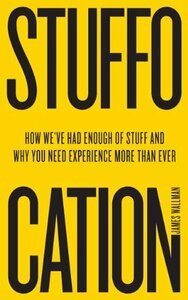You need to sign in or sign up before continuing.
Take a photo of a barcode or cover
I received an ARC of this book from NetGalley.
If you picked this up thinking once again you're going to read about home organizing techniques, guess again. "Stuffocation" is about what led us to this point of having so much stuff--not just physical things, but endless food to stuff our faces, and endless digital files, emails and streaming video to keep us occupied 24/7--and if we have possibly reached the tipping point, as shown by the growing crop of minimalist blogs and the Tiny Home movement, to move from a materialist to an "experientalist" culture.
And it's an intriguing concept, one that I think might possibly snap a lot of people out of their "maybe THIS book will help me organize my closets" addiction once and for all. Seeing the connection of the Industrial Revolution, which grew the monster of the advertising industry, and then our addiction to telling ourselves we're fine as long as we have a robust GDP, among other factors-- is much food for thought. The problem is the writing is uneven, and at times the points being made are kind of repetitive. Data and anecdotes are fit in that we wait for a follow-up, or question why it's even there. And the challenge in this world applying experientalism today is 1) people who can't afford to have the big homes and a mountain of stuff in the first place that they can control downsizing; instead they're living on the edge, and 2) a vast global economy built by corporations that are, let's say, HIGHLY resistant to this potential shift. Granted, you can still monetize experiences, but not to the bank balances achieved by simply talking people into buying tons of cheap plastic crap and decorated cheesecloth we call clothing. And these same corporations are racing to the bottom to see how much lower than can make everyone's wages while still allowing them to be even some of the crap they're forced to pedal. Somehow I don't get the impression Walmart cares if their wage slaves can afford to go rock climbing or see a Broadway play anytime soon.
Sill, an interesting if at times frustrating read.
If you picked this up thinking once again you're going to read about home organizing techniques, guess again. "Stuffocation" is about what led us to this point of having so much stuff--not just physical things, but endless food to stuff our faces, and endless digital files, emails and streaming video to keep us occupied 24/7--and if we have possibly reached the tipping point, as shown by the growing crop of minimalist blogs and the Tiny Home movement, to move from a materialist to an "experientalist" culture.
And it's an intriguing concept, one that I think might possibly snap a lot of people out of their "maybe THIS book will help me organize my closets" addiction once and for all. Seeing the connection of the Industrial Revolution, which grew the monster of the advertising industry, and then our addiction to telling ourselves we're fine as long as we have a robust GDP, among other factors-- is much food for thought. The problem is the writing is uneven, and at times the points being made are kind of repetitive. Data and anecdotes are fit in that we wait for a follow-up, or question why it's even there. And the challenge in this world applying experientalism today is 1) people who can't afford to have the big homes and a mountain of stuff in the first place that they can control downsizing; instead they're living on the edge, and 2) a vast global economy built by corporations that are, let's say, HIGHLY resistant to this potential shift. Granted, you can still monetize experiences, but not to the bank balances achieved by simply talking people into buying tons of cheap plastic crap and decorated cheesecloth we call clothing. And these same corporations are racing to the bottom to see how much lower than can make everyone's wages while still allowing them to be even some of the crap they're forced to pedal. Somehow I don't get the impression Walmart cares if their wage slaves can afford to go rock climbing or see a Broadway play anytime soon.
Sill, an interesting if at times frustrating read.
The stories of people living alternative lives were the highlight. The fervent insistence that you and me and everyone else can continue living within capitalism and systems of perpetual economic growth forever, we just need to tweak the way we think about things a tiny bit, and that this is somehow in fact the ethical choice because high levels of some form of consumption are actually required of us, was the lowlight.
Great concept - we need to get rid of "stuff" and add more experiences to our lives. I spend too much time managing the things I own and dream about the freedom I would have if I just didn't own so many things. Time to declutter......
An interesting take on kicking materialism by focusing on experientialism instead of the often suggested, but less realistic minimalism. Some of the case studies venture into silly/unrealistic extremes to drive the author's point (owning many things will KILL YOU is one that's driven way too hard in early chapters). Despite some repetitiveness and not fully agreeing with every idea, it still provides a somewhat fresh perspective on motivations behind owning less and I'm glad I read this.
solid 3 stars. the book has an interesting and intriguing topic, it mentions something that's not widely spoken about. but, in my opinion, it could have easily been 150 pages instead of 300. it feels like the author is repeating himself after a point, I was really bored while reading the last few chapters.
informative
slow-paced
Appropriate for white male middle class private sector workers.
I am grateful for the author's motivation and intentions to do a research about "Stuffocation". That is quite detailed, easy to read and realistic.
However, if you do have some basic knowledge of minimalism, I believe that you will find this book quite repetitive and basic.
However, if you do have some basic knowledge of minimalism, I believe that you will find this book quite repetitive and basic.
Ironically for a book about getting by with less, it could have been more succinct, but did make a lasting point about collecting experiences instead of things. If you're looking for motivation to pare down, start with reading this book.
I think this reviewer said it much better, but here it goes anyway:
For a book dealing with clutter and minimalism (and other similar subjects), it sure was cluttered! The idea was good, some of the information you could extract was interesting, but to get to it you had to wade through a mix of extremely boring anecdotes/quasi-stories, and loads of fact dump (it kept going from one to the other indiscriminately). Eventually I just grew bored and gave up reading it. I just don't have the patience for it.
For a book dealing with clutter and minimalism (and other similar subjects), it sure was cluttered! The idea was good, some of the information you could extract was interesting, but to get to it you had to wade through a mix of extremely boring anecdotes/quasi-stories, and loads of fact dump (it kept going from one to the other indiscriminately). Eventually I just grew bored and gave up reading it. I just don't have the patience for it.
It's interesting how STUFF has a negative impact on my life & mood.
Really enjoyed this but did expect better when i heard about it initially.
Really enjoyed this but did expect better when i heard about it initially.





